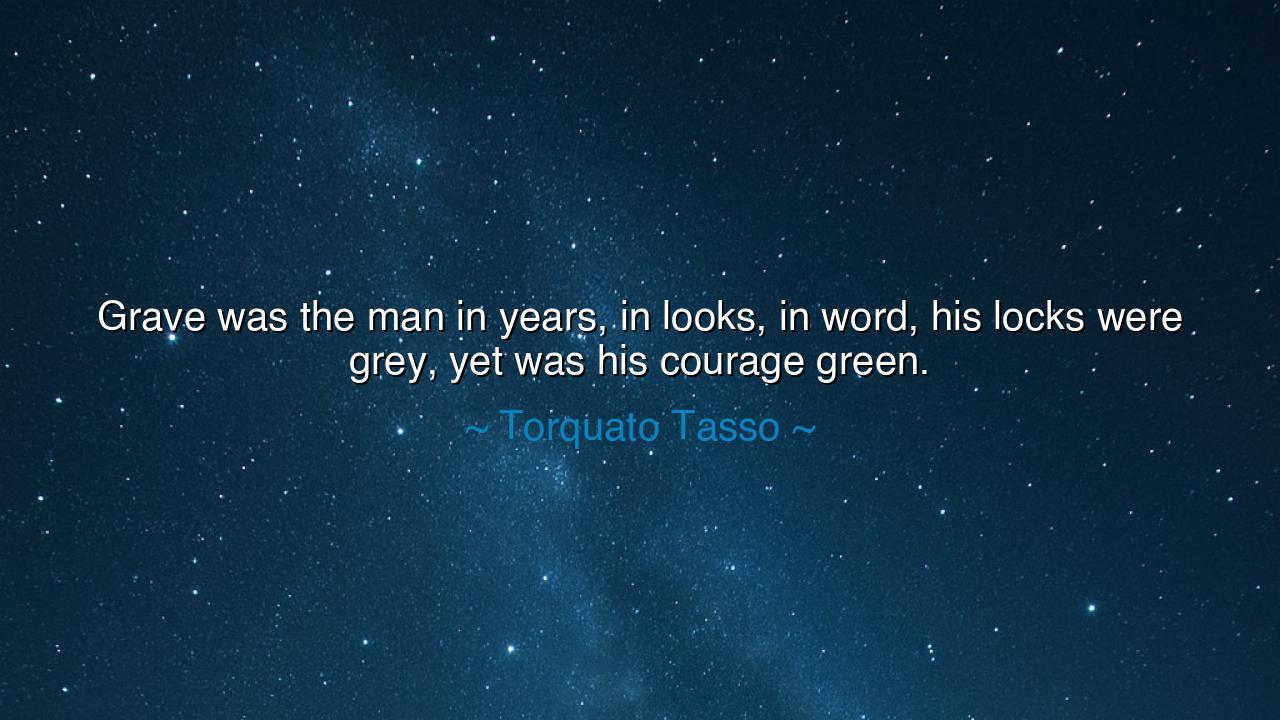
Grave was the man in years, in looks, in word, his locks were
Grave was the man in years, in looks, in word, his locks were grey, yet was his courage green.






“Grave was the man in years, in looks, in word, his locks were grey, yet was his courage green.” Thus wrote Torquato Tasso, the great Italian poet of the Renaissance, whose words echo through the centuries like a hymn to the indomitable spirit of humankind. In this verse, Tasso paints the portrait of an elder whose body bears the marks of age—grey hair, solemn countenance, the weight of years—but whose courage, that inner fire of the soul, remains green, vibrant, and alive. It is a tribute to the timeless vigor of the heart, to the truth that while the flesh may wither, the spirit need not grow old.
The origin of this line is found within Tasso’s epic poem Jerusalem Delivered, a masterpiece that celebrated faith, heroism, and divine purpose. In a world weary from war and struggle, Tasso saw that true valor was not born of youth or strength alone—it was born of conviction. His words praise a man whose wisdom is seasoned by experience, yet whose heart still burns with the courage of youth. “His locks were grey,” he writes, acknowledging the passage of time; “yet was his courage green,” declaring that age cannot conquer the will to act nobly. Here lies the essence of Tasso’s wisdom: that youth of spirit transcends the decay of the body, and that true greatness is found not in years, but in the heart’s eternal renewal.
The ancients understood this truth well. Cicero wrote that old age, far from being a burden, is a crown for those who have lived with virtue. Sophocles, even in his final years, penned tragedies that stirred the human soul. Leonardo da Vinci, though aged and frail, never ceased to dream, to sketch, to inquire into the mysteries of creation. Each of these stood as living proof that the fires of genius, curiosity, and courage do not die with the body—they live on, so long as the will to strive endures. As Tasso reminds us, the spirit that remains “green” is one that refuses to yield to despair, one that continues to hope, to create, and to fight for what is just, even when the body grows weary.
Consider the story of Winston Churchill, who, well into his sixties, led his nation through the darkest storm of the twentieth century. His body bore the marks of age and illness, yet his mind and spirit burned with defiance. “We shall never surrender,” he thundered, his words igniting courage in millions. Like Tasso’s hero, Churchill’s hair was grey, but his courage—that green, living force within—stood evergreen against the decay of time. It was not youth that gave him strength; it was conviction, a belief in duty, and a refusal to bow before fear. Such is the spirit that transcends mortality.
Tasso’s line also carries a deeper moral truth—that courage is not bound to the circumstances of life, but to the state of the soul. There are those young in years whose hearts are already old—dulled by cynicism, fear, or despair. And there are those whose hair is silver, whose bones are weary, yet whose eyes still blaze with hope. To keep one’s courage “green” is to keep faith alive, to resist the corrosion of disillusionment. It is to remember that each dawn, no matter how late in life, holds the promise of renewal. As long as one still dares to believe, one has not grown old.
The lesson, then, is clear: measure your age not by your years, but by the vitality of your spirit. Do not let time convince you that your best days are behind you, for courage has no season. Tend to it as a gardener tends a living tree—feed it with purpose, water it with hope, and prune away the dead branches of regret. The world does not belong to the young or the strong, but to those who continue to dream and to act with faith, no matter how many winters they have seen.
So remember, dear listener: when your hair turns grey and your step grows slow, let your courage remain green. Let your heart defy the rust of years. For age is but the shadow of the body, while courage is the sunlight of the soul. Those who keep that light alive are ageless, eternal, and ever young in the eyes of the divine. As Tasso teaches, the truest strength lies not in the vigor of the flesh, but in the evergreen courage that dares to face the storm—and still believes in spring.






AAdministratorAdministrator
Welcome, honored guests. Please leave a comment, we will respond soon